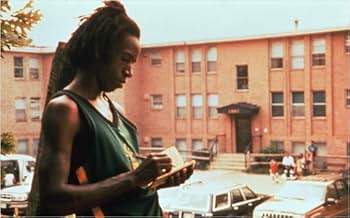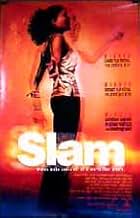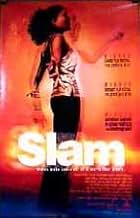Großer Preis der Jury, Sundance Film Festival 1998. Ein talentierter Jugendlicher (Saul Williams) bewältigt Kriminalität und Verzweiflung in der Stadt, indem er an Poetry Slams teilnimmt. So... Alles lesenGroßer Preis der Jury, Sundance Film Festival 1998. Ein talentierter Jugendlicher (Saul Williams) bewältigt Kriminalität und Verzweiflung in der Stadt, indem er an Poetry Slams teilnimmt. Sonja Sohn aus "The Wire" spielt mit.Großer Preis der Jury, Sundance Film Festival 1998. Ein talentierter Jugendlicher (Saul Williams) bewältigt Kriminalität und Verzweiflung in der Stadt, indem er an Poetry Slams teilnimmt. Sonja Sohn aus "The Wire" spielt mit.
- Auszeichnungen
- 4 Gewinne & 4 Nominierungen insgesamt
- Public Defender
- (as Rhozier T. Brown)
Empfohlene Bewertungen
Basic story in two sentences Raymond Joshua (Saul Williams, also one of the film's co-writers) is set up to go to prison for pot, and while in prison he meets a few people that recognize his skills as a writer and poet.
When he gets out he wants to hold on to the freedom he knows he can attain, but he doesn't know how. With this conflict, Raymond is a character that is recognizable and identifiable with the audience. And with this, Williams creates a constantly believable performance even when his character may not sound entirely believable or realistic.
Although the performances are a plus for the film's success, such as Bonz Malone as Hopha, and Sonja Sohn as the writing teacher/poet Lauren, for me the style over-passed the substance. Though the poetry was inspired and the poets in the film who spoke them were very good, some of the story elements were not as effective as they could've been. For example, there's a blind-men analogy when Raymond gets out of jail and sees that his pot-dealer friend, who got shot, is now blind. Raymond is morally in the right in their final scene together, but it's a little too thick of a message for my taste when Raymond says, 'I once was blind too, now I can see.' Williams' poetry (which I assume he wrote himself) is interesting, although it's his delivery that catches my ear over the content. In a pivotal scene his poetry saves him from a beating in the prison yard, yet somehow it doesn't feel as real as some of the other scenes, like with him and Malone's character.
As I said, the style was what held the film, especially for such a low budget. I loved the use of the hand-held, shaky mis-en-scene, as though someone was allowed to peek into the atmosphere of DC. And from a psychological standpoint, Levin seems to extract what the essence is of Raymond and his neighborhood. Through his usage grainy color and then to a 8mm camcorder for flashbacks from Raymond, I felt the emotional impact that Levin was going for, the mix of disorientation and of being in a free-fallin' kind of society where you don't know what can happen next. I just wished that I saw more of that with the characters and the story. Cool ending though. B
This film is definitely a milestone in black cinema. Its fresh, breathtaking, original, powerful and 'takes no prisoners' (mind the pun).
And a couple of word about the soundtrack - the ever excellent DJ Spooky takes the credits combining the most powerful hip hop outfits around, to create an intensive soundtrack which completes this film and leaves you open jawed.
It's not the best acted film in the world, like some reviewer said, but it might at the top level among the other best. The film is also very nicely shot. It doesn't actually feel like a documentary, but more like what it really is: Quite cheaply and simply (=that means freely) made self-expression. You can feel the joy of the making. I don't have to even mention that the soundtrack is great: One of the best. The world needs this kind of movies. (Or does it?...) At least somebody's world does. Somebody else's world might need movies that glorify violence. This is not that kind of movie. This is not 50 cent. This is not death. This is life.
To quickly generalize: if you appreciate Spike Lee's work, you'll probably like Slam. Although Spike might be a little upset that a white Jewish director brought this to film :-)
Wusstest du schon
- WissenswertesThis film was restored by the Academy Film Archive and the UCLA Film & Television Archive. Funding was provided by the Academy of Motion Picture Arts and Sciences, Sundance Institute, UCLA Film & Television Archive, and the restoration premiered in 2024 at the UCLA Festival of Preservation.
- PatzerWhen Ray is on his way to the poetry night, he gets on the metro at the Cleveland Park station, rides, and gets off at the metro at the same station: Cleveland Park.
- Zitate
Ray Joshua: The wind is the moon's imagination wandering. It seeps through cracks, ripples the grass, explores the unknown. My love is my soul's imagination. How do I love you? Imagine.
Top-Auswahl
- How long is Slam?Powered by Alexa
Details
Box Office
- Budget
- 1.000.000 $ (geschätzt)
- Bruttoertrag in den USA und Kanada
- 1.009.819 $
- Weltweiter Bruttoertrag
- 1.009.819 $
- Laufzeit1 Stunde 40 Minuten
- Farbe
- Sound-Mix
- Seitenverhältnis
- 1.85 : 1
Zu dieser Seite beitragen





























